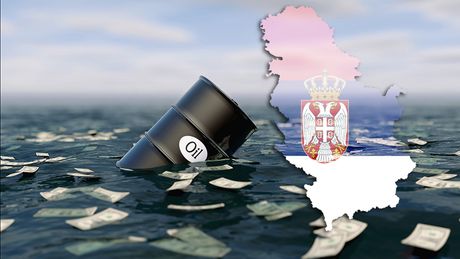Gas goes to €4,000, oil to 130, wheat sold to Egypt for $530 - it was 250 last week: "This is unheard of"

One of the panels at the Kopaonik Business Forum on Monday was dedicated to investments. As was said at the beginning, the current tensions in the world will spill over to us.
Zoran Drakulic, the president of the Business Club, said in his introductory speech that what has been happening with the price of energy yesterday and the day before is unprecedented.
"The price of gas reached almost 4,000 euros, and of oil 130. Food has become more expensive - for the first time in history, two shipments were sent to Egypt for $530 per ton of wheat. For comparison, last week in Serbia a ton wheat cost 250 euros, so it has doubled in price," he said, adding that all this will affect economic trends.
He stressed that domestic investors are not investing enough, and that some, like him, do not feel safe.
He added that the world cannot withstand current energy prices and inflation, which will create the most problems and affect both the citizens and the economy in Serbia.
During the panel, titled, "Serbia as a host - the investor community perceptions," Drakulic admitted that last year no one at the Kopaonik Business Forum (KBF) had given serious consideration to the pandemic at its beginning, and then soon after the world was in a catastrophic situation.
"Now the world owes 100,000 billion euros and the global debt is higher than the global GDP. A lot of money has been printed to bring the world back to normal. This is a different world today," Drakulic said.
Drakulic added that there were about three billion euros a year of direct foreign investments in Serbia in previous years, but that the question now is what will happen on that front.
He stressed that the state gave some of its resources for ore rent of four percent, such as copper exploitation.
Drakulic said that we have a million hectares of uncultivated land in Serbia, and stressed that Serbia could produce five million tons of oil per a million hectares through energy crops.
Zoran Petrovic, the president of the Board of the US Chamber of Commerce in Serbia, said that Serbia "lags behind the countries of Central and Eastern Europe and has had a modest share of investments in the GDP, but the problem is no longer in state or foreign investments, but in private, small ones."
Petrovic also claimed that there are not enough domestic investments because, according to him, we have a problem with the rule of law and corruption. He said that the problem for Serbia is that we import more than we export.
Petrovic said that because to the situation in the world, growth in the Eurozone will be "shaved off", as well as in the countries of Central and Eastern Europe, and in Serbia.

"Inflation will be the main problem for everyone. The average inflation will be 7.5 percent, while last year it was four percent. That will create various problems for both citizens and the economy," he said.
The president of the Board of Directors of the Japanese Business Alliance in Serbia, Goran Pekez, said that two large Japanese investors, Nidek and Tojo, have come to Serbia, are building factories and plan to employ up to 5,000 people.
The Ppresident of the Management Board of ICT Hub, Dejan Randjic, said that it is best for Serbia to, in these circumstances, focus on what is in line with its needs and where it has the greatest potential.
This will be one big lesson for investors, Randjic added.
Vice President of MK Group Aleksandar Kostic said that ten days ago, before buying Sberbank in Serbia, they were nervous about where to invest money and just wanted to invest it.
"Today we are of a different opinion," Kostic added.
Rising energy prices increasingly boost inflation
The biggest danger for the European economy, as well as the economies of the Western Balkans and Serbia, are the rising energy prices that are creating increasing inflationary pressure on households and companies, said Alessandro Bragonzi, the head of Regional Representation for Western Balkans at European Investment Bank (EIB).
"We also see the risk of a limited fiscal space due to rising costs for military purposes, as well as keeping energy prices for households under control," Bragonzi said at the Kopaonik Business Forum.
That, he added, will reduce the fiscal space for capital investments.
Video: Mali: At the time of the greatest economic crisis, Serbia is progressing the fastest
(Telegraf Biznis)
Video: Snimak paljenja automobila u Zemunu
Telegraf.rs zadržava sva prava nad sadržajem. Za preuzimanje sadržaja pogledajte uputstva na stranici Uslovi korišćenja.

